Yves here. I must confess to not having read Mackinder and even for those who have, Alfred McCoy’s analysis based on Mackinder’s “World Island” theory. A quick search did not turn up what I would very much like to have seen: an overlay of Mackinder’s “pivot area” with a map of modern Russia, as in what exactly lies out of Russia’s confines.
I hate to invoke Wikipedia, but it does list an important critique of Mackinder:
Mackinder only considered land and sea powers. In modern day time there are possibilities of attacking a rival without the need for a direct invasion via aircraft, long-range missiles, or even cyber attacks.
A blind spot, as opposed to lack of prescience, of Mackinder, lay in seeing Russia as technologically and even socially backwards, and not recognizing that Russia could and would catch up and even surpass the West in military prowess.
By Thomas Neuburger. Originally published at God’s Spies
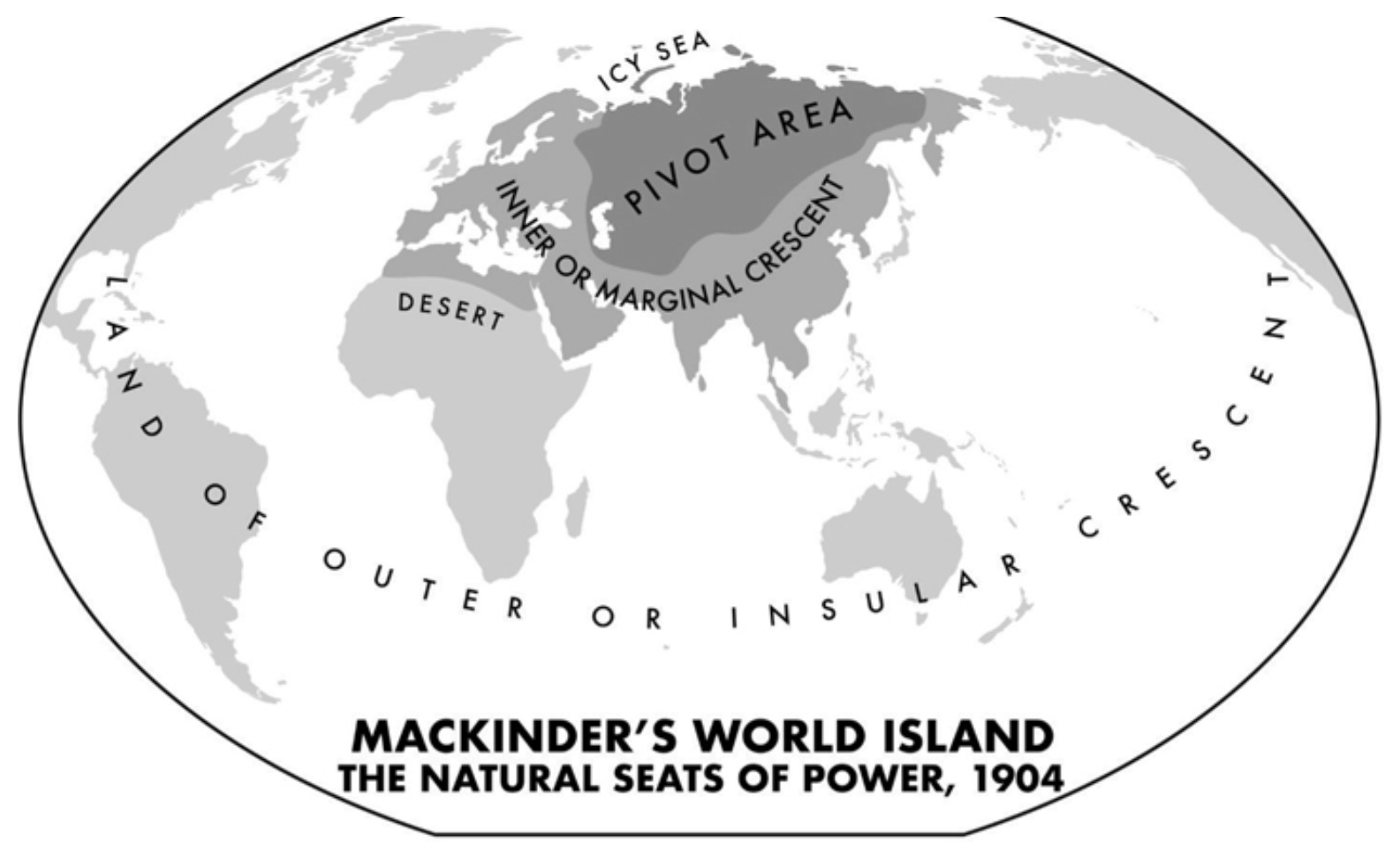
Image source: Alfred McCoy, To Govern the Globe, Chapter 1
We’re approaching the end of our look at Alfred McCoy’s To Govern the Globe, his examination of the centuries-long Western project to, well, govern the globe.
Links to previous parts of this series appear below:
- Introduction: ‘To Govern The Globe’ — A view from the edge of the cliff
- Alfred McCoy: The Quest for Global Control — The Iberian Age
- Alfred McCoy: A World in Transition and the Rise of Capital Rule — The Dutch encroach on the Spanish and Portuguese Empires
- Alfred McCoy: The British Empire and Scientific Racism — Justifying Western abuse in the 19th century
Today we’ll examine a single persistent notion, an idea that has driven the West since the global project began — the domination of Asia, which Western strategists came to call the “world island.”
Consider the image below, from McCoy’s Chapter 2, “The Iberian Age.” It shows the Portuguese Empire circa 1570.
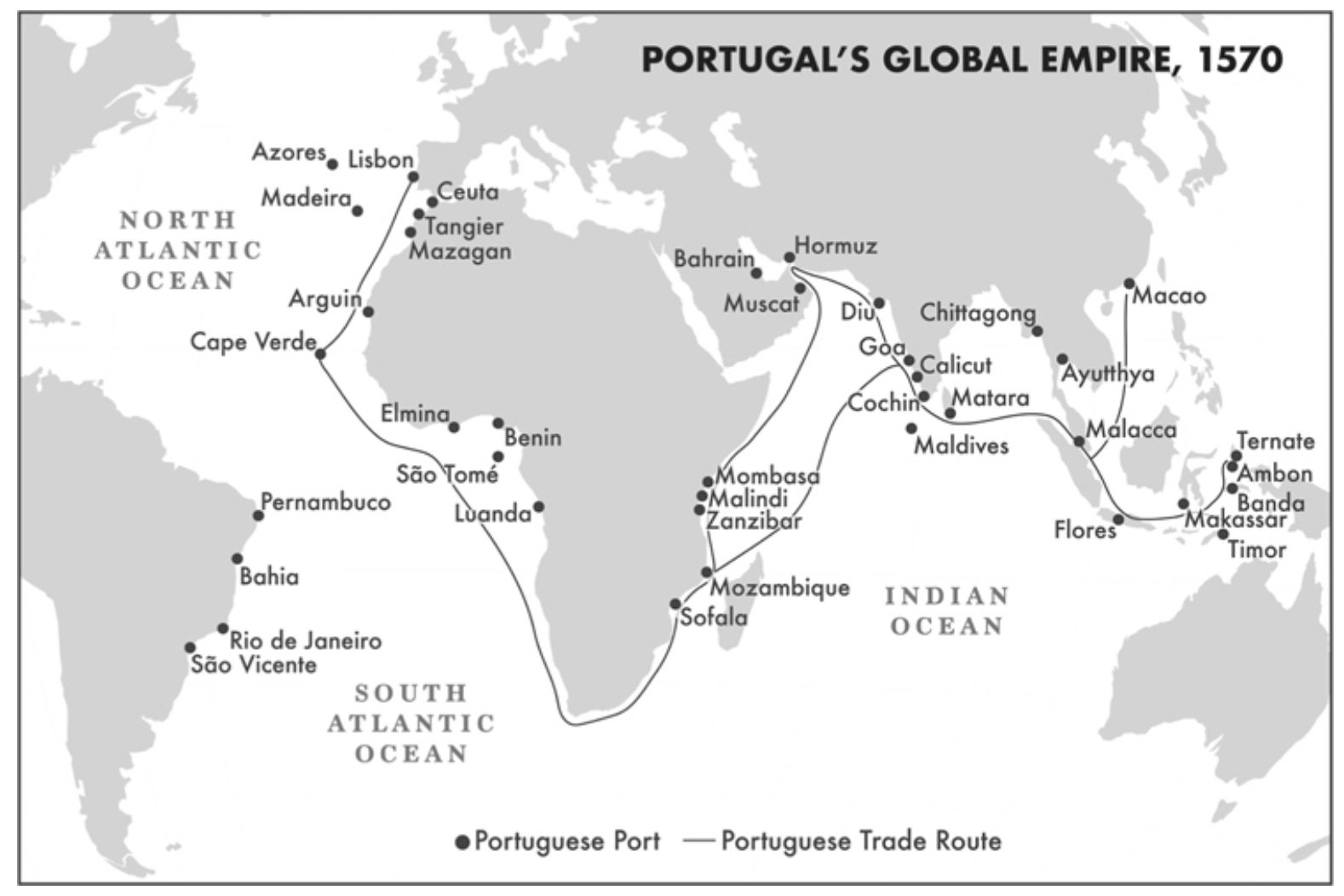
Note that while this is ostensibly a map of trade routes and ports — not military installations per se — it foreshadows what’s to come in Western thinking.
Note also that the ports and routes consist of two parts — those that dominate littoral (coastal) Africa to secure the Portuguese slave trade, and those that dominate littoral (coastal) Asia to secure access to that continent’s great wealth. (Littoral, noun and adjective, comes from the Latin for “shore.”)
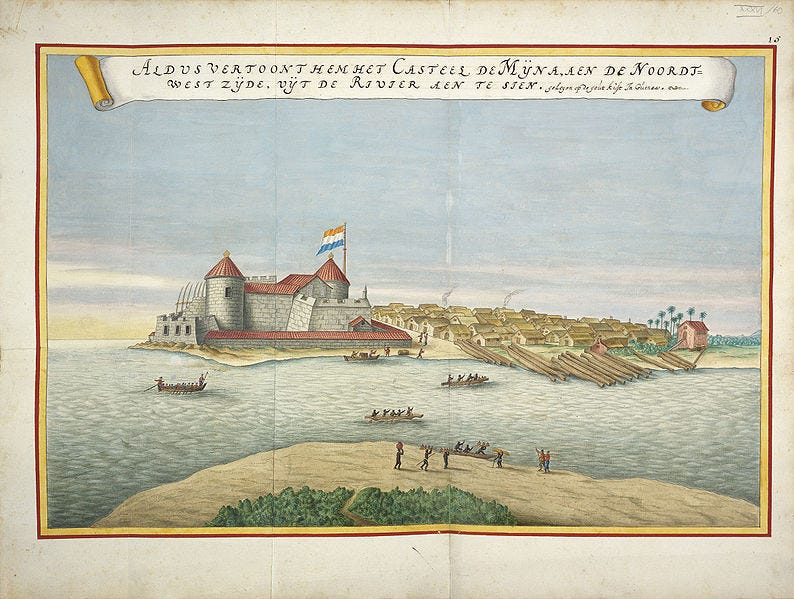
Elimina Castle, or St. George Castle, Gold Coast (present day Ghana), from the Atlas Blaeu van der Hem, 1665-1668. The Portuguese established Elmina on the Gold Coast as a trading settlement in 1482. It eventually became a major slave trading post in the trans-Atlantic slave trade. The Dutch seized the fortress from the Portuguese in 1637.
The slave trade eventually disappeared, but the domination of littoral Asia, the Asian coast, as a way to dominate the continent itself has informed Western strategists from that day through now. Why else do you think the West is today so upset about China building out islands in the South China Sea to use as bases? Answer: The West doesn’t want China to challenge Western control of its coast.
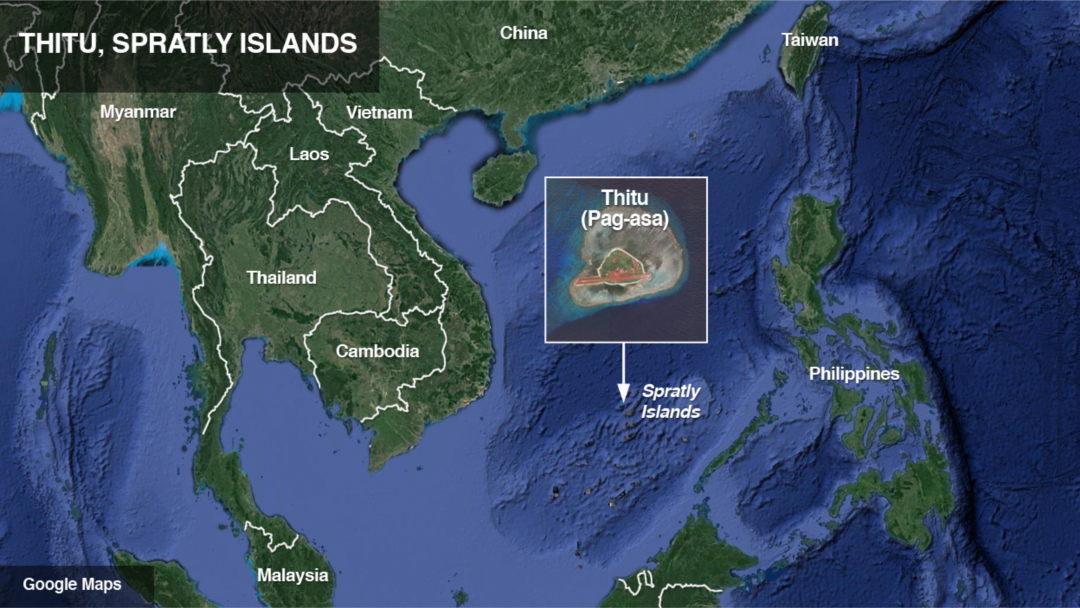
Image source
The West wants control for itself. The thinking behind dominating the coast of Asia goes way back. Let’s take a look through Alfred McCoy’s eyes.
What is Geopolitics
McCoy’s notion of “geopolitics” as a way of managing empires underlies the West’s whole strategy. From Chapter 1 (emphasis mine):
Geopolitics is essentially a method for the management of empire through the use of geography (air, land, and sea) to maximize military and economic advantage. Unlike conventional nations, whose peoples can be readily mobilized for self-defense, empires are, by dint of their extraterritorial reach and the perils inherent in the overseas deployment of armed forces, a surprisingly fragile form of government. They seem to require a strategic visionary who can merge landforms, seascapes, and societies into a sustainable global system, allowing such strengthened empires both extraordinary power and exceptional economic opportunity.
Empires are fragile and require extraordinary strategies to maintain. Hitler, for example, relied on the flawed geopolitical analysis of H.J. Mackinder — he thought the “world island” could be dominated by land — in his attempt to conquer post-Revolution Russia and prevent an Asian (Russia plus China) domination of Europe. That turned out badly.
Zbigniew Brzezinski, Jimmy Carter’s National Security Advisor, followed similar ideas when he armed Osama bin Laden and the Mujahideen in the late 1970’s in Afghanistan.
As an intellectual follower of Mackinder, Brzezinski would prove adept at applying the British don’s famous dictum about the geopolitical connection between Eastern Europe and Eurasia’s “heartland.”53 Wielding a multibillion-dollar CIA covert operation like a sharpened wedge, Brzezinski drove radical Islam from Afghanistan deep into Soviet Central Asia. That geopolitical gambit drew Moscow into a debilitating decade-long Afghan war, which weakened the Soviet Union sufficiently for Eastern Europe, three thousand miles away, to finally break free of its imperial grasp.
Brzezinski was proud of this move, even when, decades later, the chickens returned to the roost and these wars began to come home.
“What is most important to the history of the world?” [Brzezinski] asked in 1998. “The Taliban or the collapse of the Soviet empire? Some stirred-up Moslems or the liberation of Central Europe and the end of the Cold War?”54
That’s geopolitics at work — modern attempts to dominate “the world island” by land or by sea. Needless to say, attempts to dominate by land have, all of them, failed.
Controlling the ‘World Island’ by Sea
Enter the American strategic thinker Alfred Thayer Mahan, a rather incompetent Navy captain and a more respected historian at the Naval War College. Mahan wrote extensively about the importance of sea power in the 1890’s, and his work formed the basis of American naval strategy in the Pacific from then until now. From Chapter 1 (emphasis mine):
When Washington [meaning the U.S.] took its first steps onto the world stage in the 1890s, an American naval historian, Captain Alfred Thayer Mahan, argued that sea power was, through the exceptional mobility of warships, the key to national security and international influence. His writings inspired Washington’s decision to build a blue-water navy and seize an empire of islands for naval bases stretching halfway around the globe, from Puerto Rico to Hawaii and the Philippines. Mahan’s international influence was extraordinary. His view that modern wars turned on a concentration of capital ships for a “decisive battle” would shape the strategies of Germany in World War I and Japan in World War II.46
Mackinder’s and Mahan’s geopolitical ideas formed the basis of modern strategic thinking. Those ideas even preceded their writings and properly describe the Western Project from its start.
If we combine Mahan’s emphasis on naval strength as the means to control continents with Mackinder’s focus on the “world island,” we will find that a succession of leading empires—Portuguese, Dutch, British, US, and Chinese—have all tried to achieve global power by dominating that tri-continental landmass of Europe, Asia, and Africa. Indeed, Portugal’s sixteenth-century chain of 50 fortified ports around Africa and across the Indian Ocean seems strikingly similar to China’s current string of 40 commercial ports covering much of the same terrain. Of course, China’s position has also been strengthened by a transcontinental grid of railroads and pipelines. Beneath the visible, much-discussed issues of trade and technology, this geopolitical strategy has become a battering ram for Beijing to break Washington’s control over Eurasia and thereby challenge its global hegemony.
The ‘Pax Americana’
This leads us to consider the present imperial age, what came to be called (by Americans) “Pax Americana.” That American Peace was, from the start, to be achieved through empire, and according to Mahan, the leading geopolitical thinker of his day, that empire rested on sea power. In America’s case, that meant the need to dominate strategic Pacific islands (emphasis mine):
Written at a time when America was just beginning its ascent to global power and expanding its navy, Mahan’s book made the crucial argument that Washington needed both to build a battle fleet and to capture island bases that could control the surrounding sea-lanes—particularly in the Pacific. In marked contrast to the Royal Navy’s chain of fortified bastions that made an “extensive empire, like that of England, secure,” US warships with “no foreign establishments, either colonial or military” would be “like land birds, unable to fly far from their own shores. To provide resting-places for them … would be one of the first duties of a government proposing to itself the development of the power of the nation at sea.”17 In reviewing the book for the Atlantic Monthly, a young Theodore Roosevelt wrote: “Captain Mahan shows very clearly the practical importance of naval history…. We need a large navy, composed not merely of cruisers, but containing also a full proportion of powerful battleships.”18
China and the Pacific Littoral
The book contains a lengthy and fascinating discussion of the way the U.S. came to rule the Pacific. Consider, for example, that in the 1920’s much of the West had claims (“mandates”) to Pacific territories.
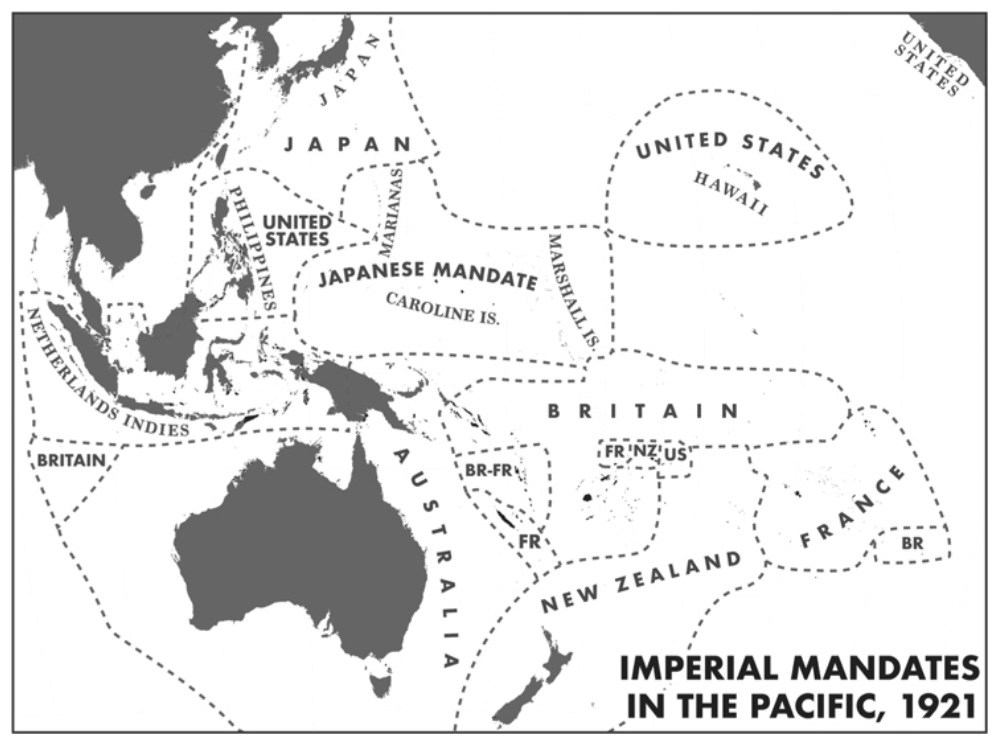
But in the end, World War II, which closed a dying imperial age, that of the British, had birthed the aforementioned Pax Americana, the next new world order. And under the veneer of what McCoy calls “liberal internationalism” — which means, for example, the ideals behind the U.S.-led United Nations — lay the reality of consolidating and keeping power. On this contradictory stance, McCoy cites George F. Kennan, the chief architect of U.S. post-War foreign policy, who saw the situation clearly:
“We have about 50 percent of the world’s wealth but only about 6.3 percent of its population,” said George Kennan in 1947, when he was chief of policy planning at the State Department. “Our real task in the coming period is to devise a pattern of relationships which will permit us to maintain this position of disparity without positive detriment to our national security. To do so, we will have to dispense with all … high-minded international altruism.”
U.S. global domination depended, then as now, on domination of the Pacific coast of Asia, the “Pacific littoral.” President Obama’s geopolitical strategy was to reduce American need for Middle East oil (a goal he accomplished) while simultaneously “pivoting toward Asia” and reinforcing our control of, you guessed it, the Asian coast.
As Obama withdrew troops from Afghanistan and Iraq, Washington began rebuilding its chain of military bases and strategic alliances along the Asian littoral. In March 2014, a full battalion of US Marines was deployed at the port of Darwin, Australia, on the Timor Sea, well positioned to access the strategic Lombok and Sunda Straits that lead to the South China Sea. Five months later, the two powers signed the US–Australia Force Posture Agreement allowing for the basing of American troops and warships at Darwin.158
Further north, in February 2016, the South Koreans completed a naval facility on Jeju Island, between that country and Japan, giving the US Navy access to a strategic port astride the East China Sea. Washington also signed an enhanced defense agreement with the Philippines, allowing use of several military bases astride the South China Sea.159 In combination with its eight established air and naval bases in Japan, Washington had effectively rebuilt its chain of military enclaves at the edge of Asia.160 To operate them, the Pentagon planned to “forward base 60 percent of our naval assets in the Pacific by 2020” along with a similar preponderance of Air Force fighters and bombers, which would be bolstered by “space and cyber capabilities.”161 By strengthening long-standing bilateral alliances, the Obama administration had taken the first steps, militarily speaking, toward rebuilding the US axial position on the Pacific littoral, which had long been central to its control over the vast Eurasian landmass.
Now perhaps we can understand the context of the Chinese reaction to these advances. The West has been encircling Asia with an eye to control since the mid-1400s. This is the Western Project, properly considered.
U.S. geopolitical strategy, from its earliest entry into the Western Project game, has been, explicitly, to control the Asian coast. It achieved that goal by the start of World War II, and by the end of the war and the years immediately following, achieved its strongest position to date in that region.
China, since the days of British domination, has worked to prevent Western domination of Asia. Its wish to build bases in the Spratley Island atolls are just the start of that struggle. This is what the conflict between the U.S. — inheritor of the Western Project — and China is actually about. It’s geopolitics American style.
The fight for control of Asia’s Pacific coast is six centuries old, and it will not end until the West has finally failed, or the inevitable chaos of climate makes mincemeat pie of everyone’s empire dreams. And now you know.


Michael T Klare: Trump’s Grand Strategy [2018]
>> in contrast to the version of globalism previously espoused by the American version of a liberal international order, this country was to pursue only its own interests, narrowly defined. Playing the role of global enforcer for allies, he argued, had impoverished the United States and must be ended. “At some point,” as he put it to New York Times reporters Maggie Haberman and David Sanger in March 2016, “we cannot be the policeman of the world.”
World Island v Hemispheric Dominance. Those Pacific supply lines are awfully long.
The Wings of the Eagle / Are Albion and Oz
Tho that cultural unity may spread thin on the wingtips. I know a couple of Aussies that are very nervous about serving as an unsinkable battleship. It’s tough being a fulcrum.
IMO, the Mackinder thesis is a swiss cheese anachronism; *but* it’s essential because some DC-type people are obssessed with it and its a foundational pillar of their world view even in 2025 and beyond. YMMV
also, the Mackinder thesis almost looks like common sense if you look at the world through the classic Mackinder map which uses a deceiving map projection (re. land size).
Look at the world with more-true-to-size projections (Gall-Peters, etc), immediately you can dismiss the ludicrous notion that the World Island is a mere “island”—-it’s neo-Pangea.
https://en.wikipedia.org/wiki/Equal-area_projection
https://duckduckgo.com/?t=h_&q=compare+contrast+map+projections+mercator+others
https://en.wikipedia.org/wiki/Mercator_projection
So, to sum it all up, the Brits having lost their American empire in the 18th and the rest of it in the 20th turned to colonizing America’s ruling class with dreams of a “Pax” in the Roman sense of “making a desert and calling it Peace.” We even now have our own mad king George who, like his predecessor Biden, thinks he is running the world.
Of course for any ruling class the myth of benevolent despotism is attractive since you get to keep all the swell perks while pretending to help the poors. It even seeps into the movies with the new Snow White morphing into a tale of a revolutionary princess out to save “my” (in the Queen Victoria sense) people.
Therefore it appears the only real way to achieve peace is to get rid of the ruling class. America tried with its Democracy and then Russian Communism tried but neither seems to have worked out. Perhaps if nothing else we can take Mackinder and toss him into the dustbin of history. Mahan too. Navies don’t amount to much in an era of hypersonic missiles.
The British ruling class definitely live vicariously through the American rule. I’m not certain they have much influence. But they like to pretend they do and also like to pretend America took over the mantle from them.
Prince Andrew was… erm… maybe living a little more than vicariously on Epstein’s Island. ;)
The Athenian empire, a full fledged democracy for the Athenian males, after succesfully militarizing because of need, ruined their democracy and budding empire with the Sicilain invasion…
Mackinder’s world island is seriously out of date. In 1904 most of Russia was backward and China was a shambles that was being cut up by the western powers at the time. Now? Russia is a modern, prosperous country and China is the biggest industrial power in the world and the empires of the time are long gone. I thought back in the 90s that the time of empires was now behind us. How wrong I was. They are back again and even Turkiye’s Erdogan is dreaming of a Turkish empire running from Turkiye to inside western China. But I have been thinking how these new empires will caste themselves and we see the pattern already.
Global majority countries will just be sources of rocks or crops. They will be shipped out of there raw with no value-adding or refining being permitted. Additionally, they will be “persuaded” not to grow their own food but only export crops and using the money earned to buy US or EU crops. Any development will be extremely limited unless it is a military base so no roads, rail, airports or sea ports to help their development. They will be encouraged to take loans that will ruin them and international organizations will go in to help sell off the assets of that country to western bidders and a big payment to local elites. It’s all a chop shop writ large
But there is a change now and this cannibalization of Global majority countries is now being done for western developed countries. The tariffs are one way but there is now an insistence that these developed countries de-industrialize and ship their industries to the US. We saw that with Biden and Europe and now with Trump and the world. The Presidents change but this is a permanent policy. The US elite now want to chop shop the developed world so that as much manufacturing as possible will be transferred there leaving those developed countries with smaller income, higher unemployment and a de-industrialized society meaning a weak voice.
As for China, just remember this-
https://twitter.com/caitoz/status/1784123161392668938
I think that the maps, in particular, bring up some points that the article also elaborates on, points that are worth considering as we try to untangle what is going on in France/Germany, Russia, Palestine, Iran, and China. I’m seeing geographical and historical hints.
First, the Pivot Area in the first map is pretty much wholly controlled by Russia, except for the Stans east of the Caspian Sea and an important strip southeast of the Caspian, which includes some highly fertile parts of Iran as well as the pilgrimage (and second largest) city of Iran, Mashhad.
Second, if we look at the Marginal Crescent, we can see a palimpsest: Think of the world in AD 300 (to AD 600). That crescent would have been the Roman Empire, Sassanid Iran (pre-conversion to Islam), Kushan / Gupta empires controlling almost all of India except the Dravidian South, and China under the Jin and early Tang dynasties. And the Silk Road truly did wander through all of them. It was a line of empires from Lusitania to Nanjing.
Thinking of current problems, I see untethered France/Germany, Italy as geographically vulnerable, Turkey likewise, Iran as the “buckle” of the Crescent, and then India and China. The U S of A and the rest of the Five Eyes are irritants and outsiders — and would be difficult to subdue militarily, which is why they continue on with their merry murderous ways.
Thinking of current problems, I note that Portugal around 1570 (don’t mention 1580!) supposedly had a population of 3 million, if that, yet those darned Portuguese had slowly hopscotched, starting some two hundred years earlier in Madeira and the Açores, across the world. By 1570, the Portuguese were trying to introduce Catholicism into Japan and, supposedly, taught the Japanese how to make tempura.
The Portuguese island empire has a model in the Venetian empire, which consisted of control of seaside cities and islands in an arc from Istria to Albania and Corfu to Crete to Cyprus.
Is this kind of empire obsolete? Or is it the model of the U.S. empire and its gazillions of military bases, Hawaii as a state, American Samoa, and Guam? Will it fail?
The article contains plenty of helpful details, although I think that the failure of France and U S of A in Vietnam is worth mentioning. Causes? Effects? Unique event?
Flying machines? We are seeing that piloted aircraft aren’t as dominant as one would suspect. The fearsome development in Iran, Ukraine, and bombed Israel is that missiles are developing at a rate that outstrips our understanding of them strategically.
I notice that the seat of this empire moves in tandom with the seat of the dominant western banking at the time, from Rome to Venice (when usury was approved), then North, then West, (with Denmark, Spain and Portugal all getting a turn) settling at the City of London for some time, and thence expanding to Wall Street.
Mackinder’s Big Island idea is quaint, insightful, and dangerous.
Quaint, because his view is so obviously stuck inside the box of his 19th century British Empire framework. Monarchy was the ‘natural’ state of society; Europe was a Continent because it was ruled by The Right People (cousins of the British Crown), not because it was an obvious geographical entity. Having beaten its traditional enemies (Spain, France), Britain was looking further afield for new enemies; Russia and Germany fit the bill. Germany’s burgeoning industrial might was the immediate threat, but it was late to the Colonization game and lacked vital resources.
Insightful, by focusing on continental-scale organization at a time when most people still believed in the power of Nation-States. He recognized that Asia’s vast hinterland held resources which could support industrial production beyond anything Britain – including its global Empire, and its friendly trading partners (USA) – could ever hope to match. Mackinder served his Empire well, by identifying a true long-term threat.
Dangerous, because focusing on that ‘threat’ would drag Britain into wars that ended – or at least hastened the end of – its global Empire.
And of course, that is the danger the USA is now focusing on, to the detriment of everyone on Earth.
I strongly believe that continental-scale political organization is inevitable. Sadly, the bad way to get there (Empire) is easier than the good way (Federation).
This framework of maritime empire relies upon naval vessels the subjugated “natives” can’t sink, and a monopoly of firepower such that small numbers of marines can engage and defeat any larger groups of indigenous defenders they encounter on land, without which ports cannot be initially seized, let alone secured. The advent of air power, particularly as transported by carriers, only further enhanced the asymmetry in favour of the maritime empires against all but the largest nations — the latter’s strategic depth posing problems that sea power alone, even with carriers, are ill equipped to overcome.
I suspect that current military technology is tipping the balance away from naval power projection of the sort Mahan likely took for granted, given its successful employment by a series of European empires and the US over the course of the preceding 300 years or so. The “natives” have traded their spears for drones and missiles, and integrated air defense makes air sorties risky and potentially very expensive when the training cost of lost pilots is added to the eye-watering expense of building and providing logistical support for manned aircraft. Ansarallah’s ability to interdict the Red Sea without a navy of its own of any consequence against the combined naval power of the US and its European allies, and their dogged resistance in the face of years of air sorties against them variously by Saudi Arabia, Israel and the US despite their having no airforce of their own suggests that the maritime powers may find that the old ways have ceased to be reliable … 🤨
Very true. I suspect (or at least hope?) that US Brass know that our aircraft carriers are quite vulnerable when floating near places where people who don’t like us have decent modern missiles.
Bonus problem: that same tech (portable anti-ship missiles) makes false flag attacks easier. After Israel attacked Iran in June, I was really worried about US carriers in the area. I figure Iran would have the sense to avoid attacking them, at least unless/until we used them to attack Iran. Sinking a US carrier would be a quick way to get Americans riled up for serious mayhem, which is why Israel would have been tempted to launch a missile from somewhere on Iran’s long – and largely deserted – Southern shoreline.
Israel sinking a US carrier would be a reprise of the USS Liberty Israeli apparent false flag event in on 8 June 1967.
This incident was alleged to have been conducted to pull the USA into the 1967 war on Israel’s side by casting blame for the attack on Egypt.
It took a long time for accurate accounts to surface.
The always dependable NYTimes would likely promote the new false flag, get the war launched, and then have a retrospective about how they got it wrong years later.
Been watching “The Diplomat,” have you?
Only snippets on YouTube. Looks like West Wing redux, complete with Allison Janney (yay!).
A well flowing summary. I think that many, many people in both the west and global south are so aware and disgusted with western hypocrisy and bellicosity that there’s almost a Manichean “good guys/bad guys” undertone to geopolitical analysis. There are no good guys, just turf wars and “messaging”: narratives and propaganda to get buy-in. Does anyone think that the Brics would voluntarily provide finance & technology with Africa to help them industrialise, or will they also try to take them over as a raw materials colony? China is more Mercantilist than even the Germans, and to keep their development and wealth accumulation going their “partnerships” may well end up like Japan’s Asian Co-prosperity Sphere. America will fight with everything it’s got to maintain the seigniorage of the USD, and if it loses may aim for a crash landing where it suffers least and rebuilds first. Power is shifting in a once in a millennium fashion. I’m afraid that these things don’t go smoothly.
The task of the US ruling class, then, is to plan our recovery from Trump et al. Does anyone think they’re up it? Is there enough of a non-MAGA ruling class to overrule the MAGAs?
Empires are unstable when the have a negative ROI (Return on Imperialism) and are not economically essential – which means that the world relies on the empire for goods and services. The $37 trillion national debt is the evidence of a negative ROI. Starting with Reagan, governments moved to bribing companies for their factories to stay in the US. They mostly used low taxes, anti-labor legislation and deregulation. Thanks to the political system, companies got all of that and free trade legislation that made it easier to offshore production and sell back into the US. These policies have made the country less competitive and less able to maintain the empire. On the essential front, the US has had a trade deficit for about 50 consecutive years and instead of it trying to be competitive it had a debt-fuelled fiesta on cheap consumption. It is now trying to bully its trading partners into paying for the privilege of selling into the US. The majority of the world now sees trade with China as essential because that is were the best combination of price and quality comes from and they are no longer embracing the US market privilege. Obviously the people in power had not read much economic history decades ago, and judging by Trump’s tariff policy, they still haven’t.